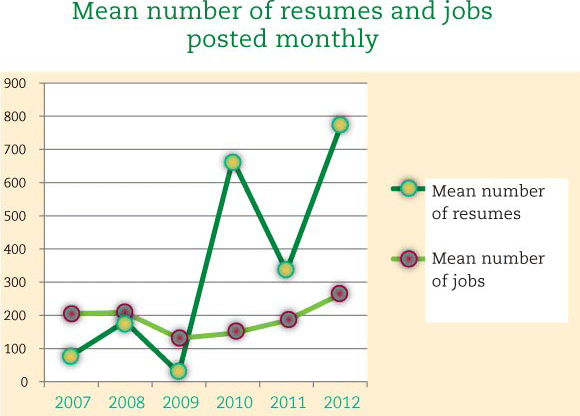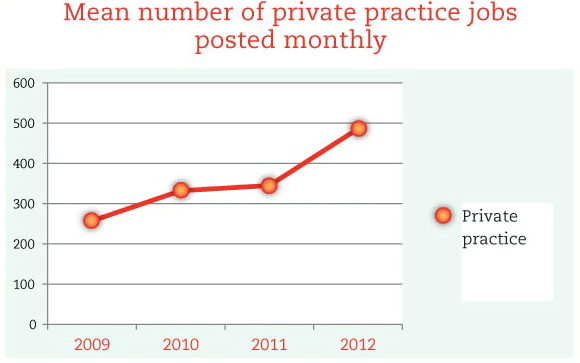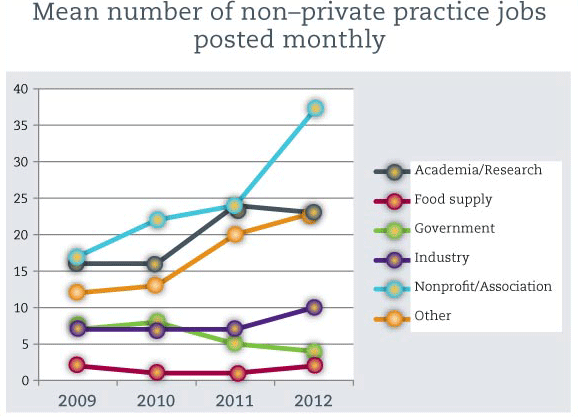AVMA job board aims to help veterinarians young and old
The AVMA Veterinary Career Center not only provides a centralized website for job seekers and employers in the veterinary field but also serves as an informal indicator for how the veterinary job field is faring. Dr. Patricia Wohlferth-Bethke, director of the Veterinary Career Center and assistant director of AVMA Membership and Field Services, talks about current trends in the veterinary workforce and what recent graduates should expect during their job search.
What’s happening with the greater veterinary profession in terms of hiring trends?
Right now, job postings are definitely up. They started going up at the end of last year, and, with luck, the economy will continue to support growth.
That said, it took a while for the recession to hit the veterinary profession. It officially started in December 2007 but didn’t impact job postings until a year later in December 2008. That’s when jobs started to plummet on the website.
2009 and 2010 were miserable for job postings after peaking in 2007. This year there are more jobs total, but certain areas are slim. There are good jobs out there, but it’s not good if people don’t want to move to accept these openings.

What else have you been able to glean from the VCC as far as trends go?
The VCC postings are mostly private practice and small animal. Food supply has always been minimal. Nonprofit postings have been going up slightly, but that sector still accounts for only 1 percent of postings. Military job postings have slowly been inching up, and industry has been, too. These companies are figuring out that to get the veterinary expertise they want, they have better luck if they go to where they are—veterinarians, that is—and not just post on their own website, because they’re missing a lot of candidates that way. And these posts draw a lot of candidates.
Location can also influence how many apply. Florida is one state where people want to move. Although, I remember a job posting not too long ago from a place in North Carolina, located on the beach, that drew a lot of applications. I couldn’t believe the number of candidates that it attracted every day.
Finally, I’ve noticed more part-time and relief jobs are being offered on the site, and they seem to get a lot of interest. In fact, there have been really good responses for relief posts.

What advice do you have for anyone posting a job opening on the VCC?
The important thing is to make sure the job is written in such a way that the person posting the job would want to work there. Make sure your job offers the chance for career advancement. As a profession, we have to continually keep up with current trends. What do you offer beyond basic care that would keep your employees interested? This is a profession that wants to be engaged and progress. If you don’t offer the chance for career development, your employees will leave for another place that does.
Typically, what kind of salaries and benefits are listed by potential employers?
A lot of the postings offer paid holidays and vacation; health, dental, and liability insurance; reimbursement for continuing education and dues; and a 401(k). Candidates should be clear what benefits are being offered before taking a job. Retirement accounts and insurance are very important, even for the new graduates who might regard retirement as the furthest thing from their mind right now.
Listings offer a decent range in salaries. A lot say base pay plus production. At the interview, always ask the expected income at the office to be staffed, especially if there is a branch office with fewer clients, if base plus production is mentioned.

What are some other questions you’d recommend applicants ask during the interview, particularly recent graduates?
They should make sure they understand the hours they’d be expected to work. Will they be staying late often? What happens with emergencies? They should also ask if there’s potential for advancement. That doesn’t necessarily have to mean ownership, but other avenues, like would the clinic expand its services to accommodate their special interests, such as exotics?
Interviewees should ask what their responsibilities will be, and all the details of their employment should be laid out in a contract. They should then have that contract reviewed by an attorney who specializes in employment law.
Also, ask if there is a noncompete agreement, and see if it’s reasonable. No one plans on leaving, but if you do, you don’t want to have to drive a long way to your next job.
And what should recent graduates anticipate will be expected of them?
While there is a period of adjustment, new grads are expected to contribute to the practice’s success fairly quickly. They need to have skills they can bring to the practice. Understanding basic business needs of the organization will contribute to their success.
Essentially, new grads can’t expect a prolonged mentoring period and must learn quickly. Everyone’s got to be up-and-running faster. They have to be more confident in their skills to make a practice money, because everyone’s hurting.
What advice do you have for recent graduates—or anyone, for that matter—applying for jobs?
“A Working Diagnosis” page on the VCC site (click on “Professional Development,” then “Personal Development”) has a lot of resources for people looking for a job. Some of the advice on there would be always research the company, especially before interviewing there, and turn off your phone at the interview. Your cover letter should be interesting enough that people want to go on to the resume. Most important, don’t forget to keep your resume updated so when you need to apply somewhere, you don’t go crazy trying to remember what you did five years ago.
Another thing, when you’re searching for a job, the VCC can be a great resource, but it can never replace good old word of mouth. Go to meetings to network or hit up old classmates. Don’t forget to get a business card, practice your elevator speech so it doesn’t sound contrived, and follow up with people who have helped you or interviewed you.